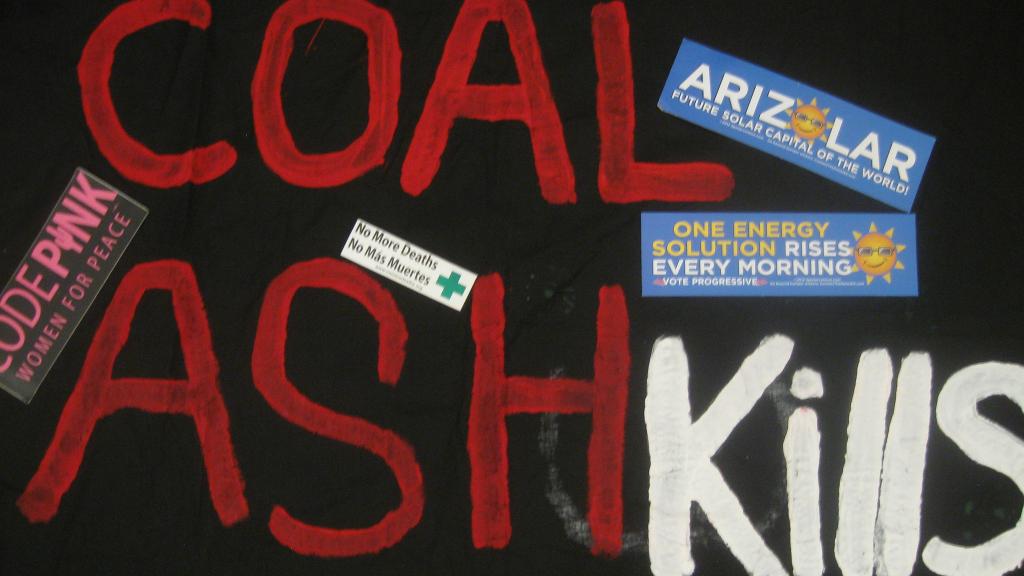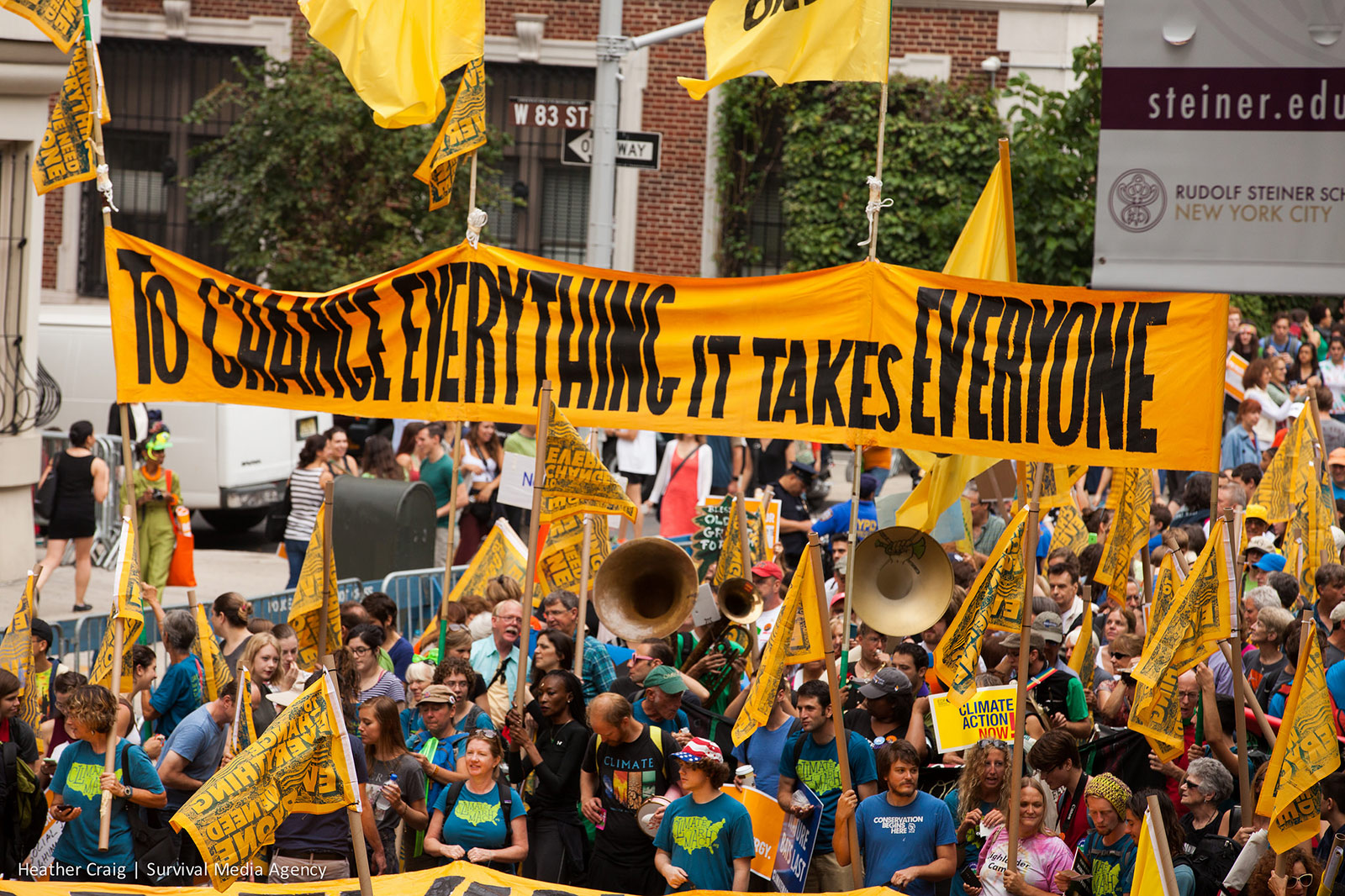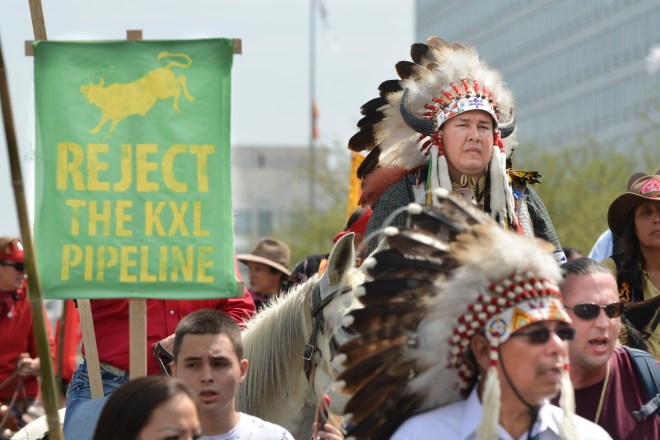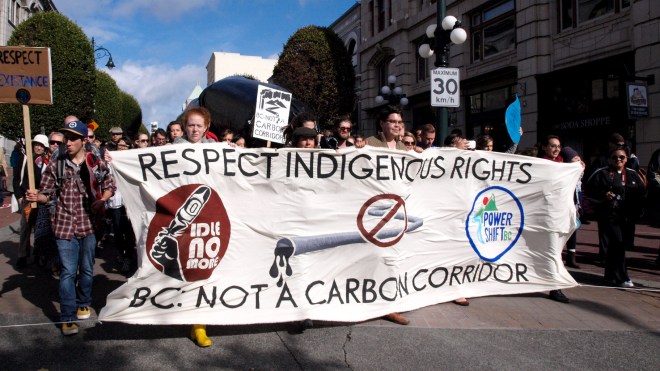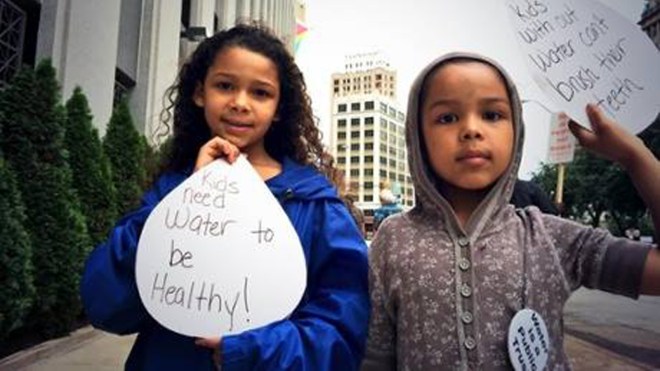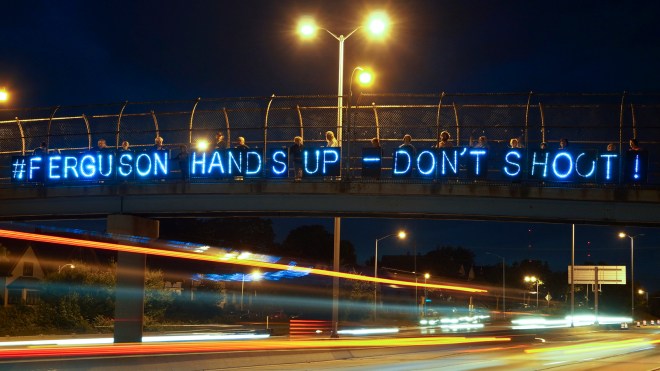Last year at this time I sat in a hotel lobby, surrounded by multigenerational families digging into buffet dinners, and typed up my predictions for how the rabblerousers of the environmental movement would fare in 2014.
What did the future hold? Would Republicans win control of the Senate, as they were so ardently planning to? Would the activism that was migrating away from one big fight (Keystone XL) dwindle once it dispersed out to smaller, more regional battles over fossil fuel infrastructure like coal terminals? Would it ever rain in California again?
Here are some things I was not expecting: the way that Twitter — despite the fact that it is now a full-fledged business beholden to its shareholders and the work of pulling in advertising dollars — would play an even bigger role in activist organizing. Certain messages — #yesallwomen, #blacklivesmatter, #alivewhileblack, #iftheygunnedmedown — took issues that the media initially passed over and kept them in the spotlight.
I was not expecting a 300,000-plus person march in New York City, and I did not expect to see coalition-building (or at least the early stages of it) between environmental groups and civil rights groups. I was pleasantly surprised to find that, when Naomi Klein’s new book came out, she did not face a chorus shouting “Commie!” just for saying that capitalism isn’t working out super well for everyone at the moment.
Here’s how it all unfolded, in a month-by-month breakdown.
January

The Keystone pipeline is pictured under construction in North Dakota in this undated photograph released on Jan. 18, 2012. Reuters/TransCanada Corporation
The pipeline formerly known as KXL South and now known as the less controversial “Gulf Coast Pipeline” formally opens on Jan. 22, at 10:45 a.m., and begins pumping crude from Cushing, Okla., to refineries in Texas. For those opposed to KXL, this is a huge bummer: Because the pipeline doesn’t cross an international border, it doesn’t need presidential approval — but somehow, Obama felt like approving it, anyway.
With the pipeline built, the only thing to do is to organize a pipeline watch in order to keep an eye out for leaks along the route. “We know the reality,” says Kathy DaSilva of Nacogdoches, Texas. “If we are not out watching, we are going to have a contaminated aquifer. We’re going to have to police this ourselves and document it ourselves.”
Also in January: the Final Supplemental Environmental Impact Statement for the rest of Keystone XL is finally released — late on a Friday, right before the Super Bowl. The report concludes that KXL won’t make a difference to the climate or the environment — not because getting tar-sands crude out of the ground and refining it is great for the atmosphere (it isn’t), but because there is so much money to be made from this resource that people will extract and sell it to someone, even if they have to charter a damn limo to drive it across the Canadian border.
February
Another draft of the environmental chapter of the Trans-Pacific Partnership (TPP) trade agreement is leaked. It does not look good. But also, the TPP — which would create trade alliances that could be used to weaken environmental regulations within its many, many member countries — appears to be fractious, and no closer to actual completion.
In Nebraska, a district court rules in favor of Randy Thompson and two other people whose property had been threatened by KXL — specifically, by LB1161, which gave TransCanada eminent domain to build across their property. To KXL’s opponents, this is an unexpected cupcake from the sky: for complex reasons, the ruling effectively resets the clock on the pipeline’s approval process.
March
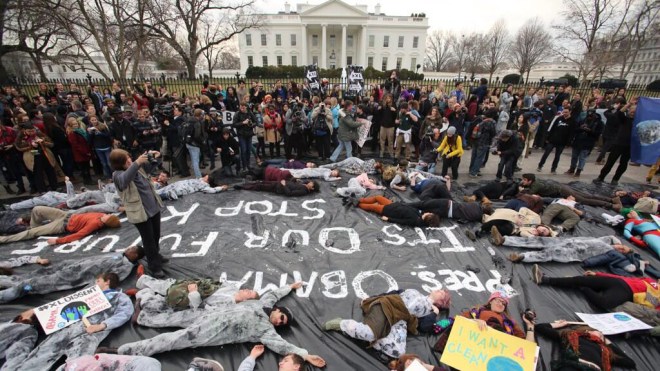
350.org
398 college students from across the country stage a die-in on a fake oil spill and lock themselves to the White House fence, then proceed to wait for six hours, in the rain, to be arrested. The protest itself, scrupulously organized by the group XL Dissent, is very much a creation of the Homeland Security era. It is carefully coordinated with Washington, D.C., police, which gave the students a discounted fine ($50 per protestor instead of the usual $100) but also demanded that they use zip-ties to lock themselves to the White House fence if they didn’t want to be charged with a felony.
In Canada, Enbridge wins government approval for its plans for Line 9B, a 38-year-old pipeline that Enbridge plans to expand and reverse the flow of. Like the ongoing boom in oil-by-rail, Line 9B is a sign of the times. As new pipelines (like KXL) hang in limbo, oil and gas companies skirt environmental review and public scrutiny by expanding old networks and pumping crude through existing pipelines.
Meanwhile, Carson City becomes the first California municipality to ban oil drilling — at least temporarily. The 25th anniversary of the Exxon Valdez oil spill rolls around, bringing with it uncomfortable realizations that it is really time to start considering tar-sands crude as “oil” in the eyes of the law and taxing it accordingly, if we want to have any money in the Oil Spill Liability Trust Fund.
April
A group called the Cowboy & Indian Alliance travels all the way to Washington, D.C., from pipeline country and occupies the National Mall for a week. Right before they arrive, Obama again delays making a decision on Keystone.
May
Detroit — which is in the middle of bankruptcy proceedings, as well as an unevenly distributed urban renaissance driven by a single billionaire — begins shutting off water to customers who are behind paying their water bills. A grassroots resistance against the shutoffs begins to develop, composed of residents who argue that water is a human right and that an income-based payment plan should be available to the city’s residents, nearly half of whom live below the federal poverty line.
June
Climate change unexpectedly becomes the big hot issue in several upcoming Senate races, particularly the one between Rep. Gary Peters (D-Mich.) and the Republican candidate, former Michigan Secretary of State Terri Lynn Land. This is almost entirely due to a $100 million midterm attack on climate change deniers in Colorado, Florida, Iowa, Michigan, Maine, New Hampshire, and Pennsylvania, organized by Tom Steyer’s NextGen climate super PAC, which is itself responding to the Koch brothers’ super PAC, Americans for Prosperity.
The Obama administration releases its new EPA rules. The federal Department of Transportation grants oil-by-rail activists something they’ve long agitated for, and issues an emergency order requiring that railroads tell state emergency responders when and where they are routing trains full of highly explosive Bakken crude. The railroads promptly turn around and try to force state emergency responders to sign non-disclosure agreements promising not to share the information with anyone else. The federal government responds by declaring that public release of details about oil-train routes and shipments do not pose a serious security risk.
Canadian Prime Minister Stephen Harper approves the Northern Gateway pipeline. If Keystone XL was Plan A, Northern Gateway is Canada’s Plan B for getting tar-sands crude to market.
The Wet’suwet’en — one of the First Nations opposed to Northern Gateway — have already built and occupied blockades along the proposed route. “We’ll just say ‘you don’t have jurisdiction,’” Freda Huson, one of the nation’s leaders, tells the Globe and Mail.
Later in June, the Supreme Court of Canada resolves a three-decades old case raised by First Nations groups in British Columbia about logging in their traditional hunting grounds. The decision gives First Nations not only control over the land that they live on, but the land where they hunt and fish — bad news for the Northern Gateway pipeline.
Meanwhile, the environmentally inclined billionaire boys’ club of Tom Steyer, Michael Bloomberg, and Henry Paulson releases the “Risky Business” report, which states that not fighting climate change will take out between $66 billion and $106 billion of coastal property in the U.S. alone.
A federal judge blocks a coal mine expansion on public land in Colorado for what could be a precedent-setting reason: failing to consider how that expansion could exacerbate climate change. On June 29, TransCanada’s permit to build the Keystone XL pipeline across South Dakota quietly expires, making KXL look less and less like a done deal.
July
The Iowa Supreme Court rules that utilities don’t have a leg to stand on when they complain that solar panel startups are muscling them out of their exclusive rights to sell electricity in an area. This ruling is just one of many battles playing out across the country at the state and local level. Washington state manages to lop $2,500 off the cost of solar panels by streamlining the installation-approval process, while other states like Florida and Wisconsin go in the opposite direction, making solar more expensive and harder to obtain.
After protesters block utility shut-off trucks and hold a giant march featuring Mark Ruffalo, Detroit Water and Sewerage District (DWSD) announces that it will stop shutting off people’s water, at least for now. Another coal export terminal planned for the West Coast bites the dust.
August
A police officer shoots and kills Michael Brown, an unarmed 18-year-old, in Ferguson, Mo. Not, in itself, an unusual occurrence, sadly. Still, something about Brown’s death really gets to people, especially after Ferguson police respond to a candlelight vigil by dragging out an eye-popping quantity of decommissioned military gear and proceeding to arrest reporters, tear-gas peaceful protesters, and act like they are putting on a summer stock theater production of Full Metal Jacket. Activist networks that have been developing since the shooting of Trayvon Martin, another unarmed teenager, two years earlier, begin to converge on Ferguson.
The state of Oregon rules against another coal terminal proposed for the Port of Morrow, and in Washington, the Lummi people launch a protest that plans to bring together indigenous tribes from the Midwest to the Pacific Northwest for a unified front against Big Coal and Big Oil.
On the East Coast, the Tennessee Gas Pipeline Northeast Expansion Project, which Kinder Morgan was planning on running between Boston and New York State, is put on hold, perhaps permanently, after activists argue that the east cost needs to focus more on renewable energy options. “Before we sink more money in gas infrastructure,” Sen. Elizabeth Warren (D-Mass.) writes in an editorial in the Berkshire Eagle, “we have an obligation wherever possible to focus our investments on the clean technologies of the future — not the dirty fuels of the past.”
September

Heather Smith
The People’s Climate March – months in the making – surges through New York City, right before the United Nations Climate Summit. It’s meant to be the most inclusive climate march ever. Some say a little too inclusive: Groups like the International Brotherhood of Electrical Workers are fighting the EPA’s power plant regulations at the same time that they are participating in the march.
People converge on New York from all over the U.S. The march appears to be everything it was intended to be: massive (more than 300,000 people turn out), peaceful, and inclusive. It appears to have very little effect on the U.N. Climate Summit — but then, not many people were really expecting it to. The next day, a smaller protest, Flood Wall Street, blocks off Broadway for several hours and results in the arrest of 102 people, including two Captains Planet and one polar bear.
The new report from the United Nations’ Intergovernmental Panel on Climate Change is released, and the Peoples’ Climate March organizers announce their support for Ferguson October, a conference in Ferguson for groups interested in protesting the militarization of police departments.
October
In Detroit, the judge in charge of Detroit’s bankruptcy, Steven Rhodes, rules that water may be “a necessary ingredient to sustaining life,” but there is no “enforceable right to free and affordable water.” A few weeks later, Catarina de Albuquerque, the U.N. special rapporteur on the human right to safe drinking water and sanitation, visits Detroit and disagrees — the city’s water shutoffs, she says, amount to a violation of basic human rights.
November
Oh, the elections. The midterm elections do not go well for environmental activists. On the local level, there are a few victories, like tiny Richmond, Calif., where Chevron spent $72 per voter to elect a more Chevron-friendly slate of candidates, and lost, big time.
Still, immediately after the elections, some unexpected good climate news: President Obama and Chinese President Xi Jinping, the heads of state for the two biggest greenhouse-gas emitters in the world, are together pursuing ambitious new emission reductions.
The lame duck Senate votes not to approve Keystone. In the chambers, Greg Grey Cloud, a Native American activist, bursts into a song of thanks and is promptly kicked out of the chamber.
In Missouri, a grand jury decides not to indict the police officer who shot Michael Brown. Protests break out across the country in Atlanta, Boston, Chicago, Los Angeles, Oakland, San Francisco, Minneapolis, New York, and Washington, D.C., all of them working from common themes — staging die-ins in public spaces, blocking highways and other main transportation routes, and targeting areas associated with holiday shopping. At this point, it becomes manifestly clear that a lot of organizing went down during Ferguson October, and that America has a burgeoning civil rights movement on its hands.
December

Reuters / Eduardo Munoz
In New York, another grand jury decides not to indict a police officer who choked Eric Garner, a Staten Island resident, to death. Protests, again, break out across the country, and many environmentalists — including the director of the Sierra Club — declare their support.
The actual details of the Trans-Pacific Trade Partnership remain mysterious, but that doesn’t stop a smorgasbord of rabblerousers from fretting about it. Digital privacy activists worry it will be used to enable surveillance. Elizabeth Warren worries it will be used to gut financial regulations. Opponents fear that with the Senate now controlled by Republicans, TPP is more likely to win approval.
All year, the price of oil has been falling, and by now a barrel costs just a little more than half its most recent peak. Oil is trading at its lowest since the recession of 2009, prompting allegations that OPEC (in particular, Saudi Arabia) is putting the screws to Iran, Russia, and the U.S. shale oil boom in one fell swoop.
It is at this moment, while fracking operators in the U.S. find themselves in a financial squeeze, that New York Gov. Andrew Cuomo announces that he will ban fracking in New York entirely.
New York isn’t the first state to ban fracking; that would be Vermont. But it’s the site of much more valuable land, fracking-wise. The ban vindicates the work of anti-fracking activists across the state, who spent years working together to use zoning to not-quite-ban fracking piece by piece, at the local level.
At a press conference, Barack Obama essentially makes fun of Keystone XL in a way that made the pipeline’s eventual approval seem highly unlikely. “Keystone is not American oil,” Obama says. “It’s Canadian oil that is wrung out of tar sands in Canada. It would save the Canadian oil companies and the Canadian oil industry an enormous amount of money if they could simply pipe it all the way through the United States down to the Gulf.”
“It’s not,” he continues, “going to be a huge benefit to U.S. consumers. It’s not even going to be a nominal benefit for U.S. consumers.”
What does 2015 hold? I have a mantra for situations like these, courtesy of one of the better philosophers of our time: “The future is unwritten.” That’s not going to stop me from trying to predict it, though. Stay tuned.
